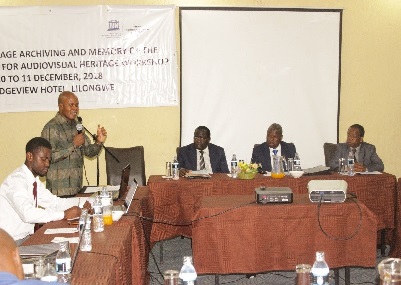-

STAKEHOLDERS CALL FOR ESTABLISHMENT OF A CULTURAL FUND
- 18,Sep 2023
- Posted By : icerim
- 0 Comments
Concerned with lack of resources to finance the arts and cultural sector, stakeholders in the sector have called on for an establishment of a Cultural Fund in order to curb financial challenges facing the sector. According to a joint stakeholders Communique, the group is calling each government institution to look for funding, establish partnerships with development partners and respond to calls for concepts and provision of training on resource mobilization and financial management. The call was made in Lilongwe during a National conference on arts and culture that was commemorated under the theme ‘Leveraging Arts, Culture and Heritage for Sustainable Development’ from 24th to 25th of October, 2022.
The statement as endorsed by different members of the creative CSOs, rights holder associations, heritage associations, private sector, the academia and government Ministries, Departments and Agencies- MDAs says they are lobbying for increased/improved funding for the sector from the government and a document on why the funding is required will soon be provided. In addition, the group made another call to government to expedite enactment of NAHEC Bill, establishment of museums, art galleries and heritage centers in order to support marketing arts and cultural industries among other recommendations. The recommendations are part of the National Action Plan of the conference which aims to ease the implementation of a cultural policy.
Earlier before the call, different speakers delivered their speech during the conference. In his remarks Head of Culture Unit at UNESCO Regional Office for Southern Africa (ROSA) Francisco Gomez Duran said that the cultural and creative industries have become essential for inclusive economic growth, reducing inequalities, and achieving the goals set out in the 2030 Sustainable Development Agenda. “As highlighted in the UNESCO Global report “Re/shaping cultural policies for creativity: addressing culture as a public good” launched in February last, culture and creativity are one of the youngest and fastest growing economic sectors in the world accounting for 3.1% of global Gross Domestic Product and 6.2% of all employment” explained Duran. According to the Head of the Unit, UNESCO ROSA is currently carrying out several initiatives in support of the development of the creative economy of the region including Malawi. Echoing Duran’s remarks, in his speech Minister of Tourism and Culture Dr Michael Usi said that Malawi should focus on making the creative sector a powerful tool of contribution to the economic growth of the country, something that is in line with the Malawi 2063 agenda. “The overall vision of the Malawi 2063 is that we should be an inclusively wealthy and self-reliant industrialized ‘upper-middle-income country’ by the year 2063. The implication for arts and culture is that we should turn around and embrace strategies which are for income generation and economic growth” highlighted Usi.
The 2-day conference was organised with an aim to provide a platform for stakeholders in the arts, culture and heritage sectors to engage and share ideas on the work they are undertaking, challenges being encountered, ideas, proposals and concrete actions undertaken for strengthening the implementation of the Malawi Cultural policy. Different activities were lined up to mark the celebrations which included traditional dances from Mtendere Cultural Troupe, live band by Music Crossroads Academy and exhibitions of artistic and Cultural pavilions in the industry.
Strengthening institutional capacities in implementing Malawi cultural policy
The “Strengthening of the Institutional Capacities in implementing the Malawi cultural policy in line with the UNESCO 2005 Convention on promotion and protection of the Diversity of Cultural Expressions” project was established with an overall purpose of enabling implementation of the Malawi Cultural Policy in line with the principles of the 2005 Convention. Malawi enacted its cultural policy in 2015 and launched it in 2018 as a tool to facilitate the effective exploitation of the arts, culture and heritage for social and economic development of the country and beneficiation of the stakeholders. The project plans to achieve this by supporting creation of an enabling environment beginning with a National Action Plan with activities aimed at building legislative, institutional and human resource capacities.
Funded by The Royal Norwegian Embassy in Lilongwe, Malawi and implemented by the UNESCO Regional Office for Southern Africa (ROSA) in partnership with the Malawi National Commission for UNESCO, the project has the following specific objectives, to;
- Promote better visibility of the Malawi Cultural policy among stakeholders,
- Enhance effective implementation of the Malawi Cultural Policy in line with the 2005 UNESCO Convention on the Promotion and Protection of the Diversity of Cultural Expressions,
- Strengthen the capacity of stakeholders (institutions, organizations, associations, creators and practitioners) in the implementation of the Malawi Cultural Policy,
- Build innovative partnerships and collaboration for the implementation of the cultural policy.
Related


